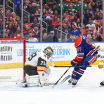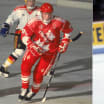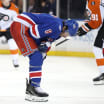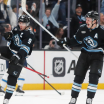Haula also has been able to transition sound defensive play into more scoring chances. In those games against Chicago, he had three goals and three assists and was a plus-6.
He could face a similar showdown with Jamie Benn's line in the series against Dallas. Benn, the Art Ross Trophy winner last season, had 89 points this season.
"I feel like they go hand-in-hand," Haula said. "If you really play good defense, you're going to have the puck more, odd-man rushes, things like that. Just because you play defense well, doesn't mean you are [only] good in your own zone. It's neutral zone, it's transition, it's puck-possession, it's everything. If you have the puck most of the night against top guys, it's going to be hard for them to generate. That's the key to it."
In addition to increased offensive production and a more prominent defensive role, Haula also is the Wild's best penalty killer and has improved his faceoff percentage from 46 percent his first two years in the NHL to 53 percent this season.
Haula credits his improvement in all facets to an increased maturity and a different outlook.
"It's growing into that veteran," he said. "[I'm] not a rookie player [anymore]. It's being able to play consistent hockey, be on top of your game every night."


















